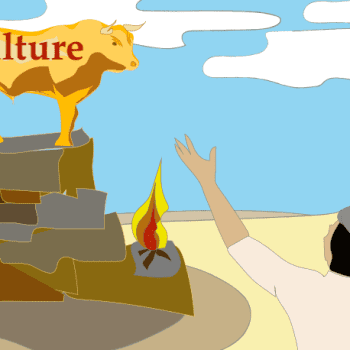How do we contextualize the gospel among animists?
In the last post, I highlighted a possible danger to be aware of when presenting the gospel among many unreached people groups. In this post, I will suggest a more constructive approach.
Credit: CC 2.0/wikipedia
How does the Bible confront other “gods”?
How did people like the OT prophets contend with polytheistic beliefs in their own contexts? I think we see a pattern in their approach.
I offer the following suggestion when confronting the false “gods” of animistic peoples.
Challenge their authority and not simply their existence.
The main thing to contend for is the sovereignty (i.e. supreme authority) of God.
I should add a brief background note. In the ancient near eastern world, kingship was linked with the worship of particular gods. After all, kings claimed divine mandate and were often reckoned sons of their people’s god. Accordingly, idolatry was linked to what we might call “politics.” Remember Daniel and his buddies? Worshipping an idol expressed political allegiance.
Idols claim power over people and places. Thus, they divide Gods kingdom. We should therefore make the following points clear.
1. The Creator God has sovereign power and authority.
- He not only gives people life; he also has power over death (cf. Acts 17:31).
- All other authorities are subordinate to the one true God.
Observe the stream of thought that extends throughout Isa 40–55. The prophet does not get into philosophical speculative debate about the meaning of deity. Rather, he proclaims that other so-called gods lack power and thus are not the Creator-king over the entire world. The Lord defeats the kings of the earth (and thus their idols).
Like the prophet Isaiah, our primary goal is to: challenge false gods’ authority, not simply their existence. We need o transfer our focal point.
This means we should identify people’s false gods.
We want to focus on who people honor as authority. If we find the authorities that people respect, we will also find their false gods. Even today, authority and idol worship are bound together.
Practically speaking, we affirm biblical monotheism by exposing those whom people most regard as authoritative. Monotheism concerns our sense of identification, . . . our allegiance. For example, to be a Jew in the ancient world meant allegiance to the one true God, the Lord, and his king (e.g. David).
Who does our life revolve around?
Idols come in many forms: statutes, money, children, homes, etc. Whose authority do they follow in order to secure benefit?
Perhaps, in one persons’ life, his mom has sovereignty. His mother, in reality, becomes his false god, his idol. By giving ultimate allegiance to his mom, the man practically reality denies monotheism as it functions in the Bible.
- The Creator King’s sphere or territory is the entire world.
Idols fragment the world, i.e. God’s kingdom. In essence, this is what human have done from the beginning: We have colonized world. We are usurpers.
This treason manifests itself in multiple ways. For example, people tend to boast in their nation, education, ethnicity, tradition, language, gender, etc.
2. Only God is worthy of worship.
What are some implications? God alone is worthy of honor and praise.
Therefore, we should not fight for face. Loving face too much inevitably leads us to wanting people to worship us! Why?
If we don’t think God alone deserves worship, then we will worship some other created thing. Yet, we should be aware that what we worship and our view of ourself are always intertwined. What we worship reflects our value system and worldview.
We become what we worship.
As result, our “face” and our worship are tied together. Eventually, our worship and our seeking of face are indistinguishable. Our “face” belongs to what we worship. We pursue our face more and more. Before long, we start worshipping ourselves.
Our mirror becomes our altar.
When we all pursue “face” (mianzi) in this way, human relationships disintegrate.
Though contrary to popular belief, we can see why biblical monotheism is the only hope we have for harmony in the world.
Concluding Thoughts
Instead of trying to prove God’s existence, we ought to challenge and question the authority of false gods. This seems to be the approach most used in Scripture.
If we look closely, we find that preaching biblical monotheism is to proclaim the gospel. Why? The gospel, like biblical monotheism, proclaims that the Creator-God is the supreme king over all nations.
Once again, we see the critical importance of getting the gospel right.
People can easily separate monotheism and evangelism. What I mean is this. People think monotheism simply prepares people to hear the gospel. Yet, truly grasping biblical monotheism through the lens of Christ will mean people will grasp the gospel.
Yes, individuals can be justified by faith, not by works. However, this does not capture the whole of the gospel. If we settle for what is gloriously yet merely true, we may compromise the gospel by missing that which binds it all together.
The gospel, like the doctrine of God, is far more robust than many of us have previously thought.














